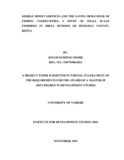| dc.description.abstract | Access to formal financial services has been a challenge to low income earning people in Kenya. Mobile money services continue to prove its potential as alternative in providing financial access to both the banked and unbanked populace. This study sought to determine how mobile money services influence the saving behaviour of people who suffer exclusion from formal financial service; specifically the fishing community in Mbita Division in Kenya. The study addressed three research objectives; to find out the saving methods used by residents of the study area; second was to determine the general effects of mobile money services on access to formal financial services by people in Mbita Division; and finally was to determine the influence of mobile money services on saving behaviour of people in the study area.
The study adopted qualitative and quantitative research designs on the target population. Data was collected from a sample 80 households using questionnaires; further, interviews were held with seven key informants. The findings revealed that fishing communities used mobile money services for different purposes ranging from sending and receiving money, paying bills, saving money and buying airtime. Majority choose to save money using mobile money services as they were accessible, easy to use, reliable, secure, secretive, convenient and cheap (low charges). Further, findings indicated as well that mobile money services were more appropriate for saving small amounts of money, and have also improved their access to formal financial institutions.
The study recommends that in order to make gain of the milestones achieved with mobile money services thus far; challenges related to the security of the mobile money services as well as regulation require attention. Noted also is that the mobile money accounts do not necessarily increase the number of bank account holders in the country, their contribution to financial inclusion is limited to improving payments, money saving (storage) and money remittance. Based on its findings, the study thus recommends the need to pursue avenues for enhancing the role of financial institutions and other key stakeholders in the opening of mobile accounts that can attract proper and crucial banking services such as credit. | en_US |

